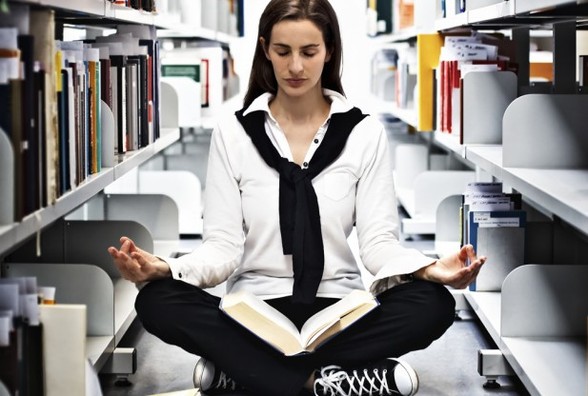 Image Courtesy: bit.ly/TC4RYD
Image Courtesy: bit.ly/TC4RYD If you think that MBA students will not be interested in something like this and would be reluctant to invest their money in this, then you could not be more wrong. The meditation course held by Father Freeman at the McDonough School at Georgetown University in Washington is currently oversubscribed.
The Meditation and MBA Connection
Around 10 years ago Father Laurence Freeman, the Director of the World Community for Christian Meditation and a Benedictine monk, was invited by Georgetown University to teach undergraduates. He usually started his sessions with meditation which was widely accepted by all students. He recalls, “Many students said it was the best part of the class”.
It was only 2 years ago that the business school showed interest after a university event related to Business Meditation. David Thomas, Dean of McDonough School, is personally interested in the meditation course as he himself likes to meditate. Fr Freeman says, “I think [business] schools are aware they have to produce leaders who can keep a sense of perspective in a situation or a crisis”.
The first course in Meditation and Leadership, which was a 6 week long programme, was held in January and February. The next session will begin in September and October.
Developing Meditation as an Academic Course
Fr Freeman was initially concerned about the fate of the course at the B-school. He says, “At the beginning I must admit I was curious about their [MBA students’] motivation. I thought they might have thought it was an easy course”.
However it was rather the opposite. The MBA students take 2 classes every week for the 6 week course and eventually earn 3 credits. The first part of the Meditation and Leadership course teaches the students about the basics of meditation, including its religious and historical aspects. It also incorporates the medical and scientific research on the effects of meditation.
According to Fr Freeman, “In the last part of our course we ask them to reflect upon what they have learnt and how they will relate that to the field in which they will work”.
The students were instructed to meditate at least twice every day for almost 20 minutes each time. All the 30 students were provided an online log to maintain notes on experience and receive feedback. Fr Freeman says, “Most of them struggled with it, some struggled a lot...I was pleased that the average performance was 70 per cent. What everyone discovered is that this is simple, but not easy.”
Many students claimed they responded differently in the classes due to meditation and appeared more helpful and collaborative. “They all said the clarity of their mind and their concentration had improved and they enjoyed the teaching and the writing more”, the Benedictine monk added.
Meditation and Mindfulness
According to Fr Freeman meditation and mindfulness is not the same thing. Mindfulness is primarily a tool or technique; whereas Meditation is more like a discipline. You have to imbibe meditation into your regular life through practice. He says, “The mindfulness programme is basically a way of achieving a calmer mind and a reduction in stress, giving a greater ability to focus. Meditation produces mindfulness in daily life as one of its benefits. Mindfulness prepares the mind and body for meditation.”
Will Meditation Inspire Ethical Leadership?
Fr Freeman thinks that it will. He says, “I think what they (MBA students) realised is if they are in an environment of high stress, and that stress is having an impact on the humanity of that organisation, they won’t be sucked into that culture. They won’t get involved in that craziness”.
He adds, “The leader has to be out in front and has to have a certain level of solitude. It can be lonely and lead you into isolation or it can be a place of integrity”.
 RSS Feed
RSS Feed
